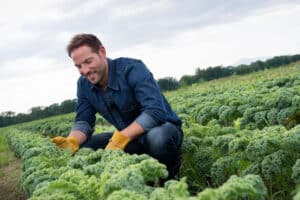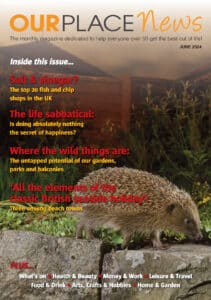This year marks the 50th anniversary of organic certification in the UK. In 1973, accreditation schemes were launched, allowing farmers to gain certification proving they don’t use harmful chemicals in their growing or production methods.

These were the salad days of climate activism – Greenpeace and Friends of the Earth were founded two years earlier – and the movement has gone from strength to strength ever since.
“It’s something that’s been going for half a century and couldn’t be more searingly relevant for what we need our food system to be for the next 50 years ahead,” says Alex Cullen, commercial and marketing director at the Soil Association, one of eight approved certification bodies.
“Both in the EU and now in the UK post-Brexit, it’s really strictly legislated – organic food essentially needs to be independently verified and inspected.”
To mark Organic September, we asked experts to describe what organic really means when it comes to food, and why it’s beneficial for us and the environment…
What is the definition of organic food?
“Lots of people associate organic with the things that farmers aren’t allowed to do,” says Harriet Bell, regenerative farming lead at organic veg box company Riverford.
“For example, an organic farmer is not allowed to spray crops with chemical pesticides or artificial fertilisers, use GM crops, or routinely (and wastefully) use antibiotics.”
However, there are other important steps producers must take to gain certification: “Organic offers the highest level of animal welfare, higher than RSPCA assured or free-range and it also promotes healthy soil biology.”
What does it take to gain organic certification?
Some farms are organic from day one, while others start out using conventional methods and later apply for certification.
“There are specific requirements for different sectors, and with certain rules for each,” says Bell.
There are different rules for growing fruit or vegetables, rearing cattle for meat or dairy, and once a producer is certified they are subject to an annual inspection, sometimes unannounced.
“For example, on a dairy inspection, you’re looking at are antibiotics being given to the cows? What level of feed is being bought in?” says Cullen.
“They’re really informed inspectors who know what to look for and really provide that due diligence in terms of how a particular farm or factory is being run.”
Environmental benefits
“Organic farmers use things like compost, green manures (living plants) and farmyard manure to bring fertility to their system and feed their soils,” says Bell, which is a lot less carbon-intensive than fertilisers produced from natural gas.
“We know that nearly a third of emissions from a carbon point of view come from agriculture,” says Cullen.
“If we stopped using fertiliser, there would be about a 20% drop in agricultural emissions, and if the whole of the UK moved to organic farming principles, we’d see a 40% drop.”
Banning harmful chemicals also increases biodiversity.
“Organic farms can have, on average, 50% more plant, insect and birdlife,” says Bell.
“A big part of that is because they don’t use pesticides, which also means they’re not contaminating our streams and rivers with these chemicals.”
Health and nutrition
“Scientists and juries in places like America are increasingly concluding that exposure to pesticides isn’t great for human health either,” says Bell.
And it’s not just a case of washing produce thoroughly to remove chemical traces, says Cullen: “A pesticide called glyphosate that’s used to dry crops has been found in bread – it survives the cooking process.”
There’s increasing evidence about the impact of pesticides on gut health and the microbiome.
“We’ve seen Professor Tim Spector – who’s leading a lot of thinking around this – he came out and talked about why he’s switched to organic, particularly on the things that he eats most often,” Cullen says.
Plus, organic crops have been shown to be more nutrient-dense, she continues: “(They have) higher levels of antioxidants and micronutrients – there’s lots of studies about the prevalence of those micronutrients.”
A worrying knock-on health effect is air pollution, even in urban environments far from farms.
“A quarter of all inner city air pollution in London is coming from agriculture, and hundreds of miles away,” says Cullen.
“Particularly nitrogen fertiliser – when it gets applied on the field, it will react and turn into air particles, and they can travel for hundreds of miles.”
(Article source: Silver Surfers)

